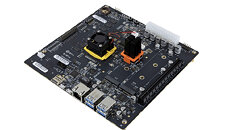
Qualcomm to Acquire Alphawave Semi
Qualcomm Incorporated today announced that it has reached an agreement with Alphawave IP Group plc regarding the terms and conditions of a recommended acquisition by Aqua Acquisition Sub LLC, an indirect wholly-owned subsidiary of Qualcomm Incorporated, for the entire issued and to be issued ordinary share capital of Alphawave Semi at an implied enterprise value of approximately US$2.4 billion.
The acquisition of Alphawave Semi aims to further accelerate, and provide key assets for, Qualcomm's expansion into data centers. Qualcomm Oryon CPU and Hexagon NPU processors are well positioned to meet the growing demand for high-performance, low-power computing, which is being driven by a rapid increase in AI inferencing and the transition to custom CPUs in data centers.
The acquisition of Alphawave Semi aims to further accelerate, and provide key assets for, Qualcomm's expansion into data centers. Qualcomm Oryon CPU and Hexagon NPU processors are well positioned to meet the growing demand for high-performance, low-power computing, which is being driven by a rapid increase in AI inferencing and the transition to custom CPUs in data centers.




































